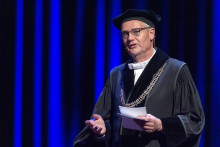Research into language requirements
In 2021, both the University Council (UC) and the Platform International Affairs (PIA) concluded that the UT's language requirements were not in line with those of other universities. They worried that the insufficient English language proficiency of international students could be an obstacle to study success and integration. As a result, the Executive Board commissioned a working group to review the English entry requirements and produce a proposal to amend them.
The working group has now submitted its report. As a result the bar has been raised slightly, by introducing requirements on sub-scores of the entry tests. However, due to a lack of data, the working group could not draw any conclusions on the correlation between English language proficiency and study success. As a next step it is proposed to improve the data-collection of the English level of students, after which a new advice can be drafted.
‘More rapid action’
During today’s meeting in Horst, the UC asked for short-term changes of English language requirements at the UT. ‘Based on the working group’s report, the bar will be raised a bit, but we think that this nudge doesn’t sufficiently address the problem,’ said Sjoerd van den Belt from UReka. ‘Our education is heavily focused on collaborative and project-based learning. Students that do not possess the required English level do not only struggle themselves, but also disadvantage every other student that they work with.’
Before any further steps can be taken, the appointed working group suggests to first collect data in 2022-2023. The Council finds this ‘unacceptable’. ‘If we rely on this data, we can draw conclusions in the next academic year and new advice can be drafted in 2024-2025 at the earliest. That is way too long,’ continued Van den Belt. ‘We want more rapid action. We cannot sit and wait for three years before we attempt to solve this problem again. We should align our entry requirements with other technical universities.’
‘Treat every student equally’
Rector Tom Veldkamp agreed that current English requirements pose a problem. He was reluctant, however, to only adjust the entry level for international students. ‘If we raise the bar for international students, we also have to raise the bar for Dutch students. We also have Dutch students who have problems with English requirements and they might blame the international students, because they speak a type of English they’re not used to. I want to treat every student equally.’
‘We agree on the problem,’ concluded the rector. ‘I understand the advice and I’m going to look into steps needed for everyone. If we want to raise entry requirements, I also want to have measures to address the issue with Dutch students. I want this to be an inclusive university. I think I will be able to present concrete solutions in the next academic year.’ The proposal should be presented to the Council in September 2022.







